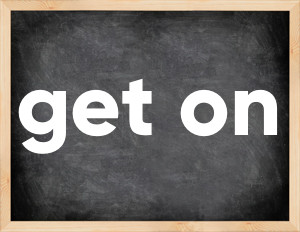 The English verb 'get on' is pronounced as [get ɔn].
The English verb 'get on' is pronounced as [get ɔn].
Related to:
phrasal verb.
3 forms of verb get on: Infinitive (get on), Past Simple - (got on), Past Participle - (got on/ gotten on).
Here are the past tense forms of the verb get on
👉 Forms of verb get on in future and past simple and past participle.
❓ What is the past tense of get on.
Get on: Past, Present, and Participle Forms
| Base Form | Past Simple | Past Participle |
|---|---|---|
| get on [get ɔn] |
got on [gɒt ɒn] |
got on/ gotten on [gɒt ɒn/gɒtn ɒn] |
What are the 2nd and 3rd forms of the verb get on?
🎓 What are the past simple, future simple, present perfect, past perfect, and future perfect forms of the base form (infinitive) 'get on'?
Learn the three forms of the English verb 'get on'
- the first form (V1) is 'get on' used in present simple and future simple tenses.
- the second form (V2) is 'got on' used in past simple tense.
- the third form (V3) is 'got on/ gotten on' used in present perfect and past perfect tenses.
What are the past tense and past participle of get on?
The past tense and past participle of get on are: get on in past simple is got on, and past participle is got on/ gotten on.
What is the past tense of get on?
The past tense of the verb "get on" is "got on", and the past participle is "got on/ gotten on".
Verb Tenses
Past simple — get on in past simple got on
(V2).
Future simple — get on in future simple is get on (will + V1).
Present Perfect — get on in present perfect tense is
got on/ gotten on
(have/has + V3).
Past Perfect — get on in past perfect tense is
got on/ gotten on
(had + V3).
get on regular or irregular verb?
👉 Is 'get on' a regular or irregular verb? The verb 'get on' is .
Examples of Verb get on in Sentences
- I want to get on a plane on time (Present Simple)
- She just about got on the train (Past Simple)
- You haven't got anything on me (Present Simple)
- We've been getting on very well since childhood (Present Perfect Continuous)
- Let me know how you get on at your new job (Present Simple)
- I think we need to get on the express train (Present Simple)
- I think we can get on without bread for a day or two (Present Simple)
- The child was afraid to get on the train (Past Simple)